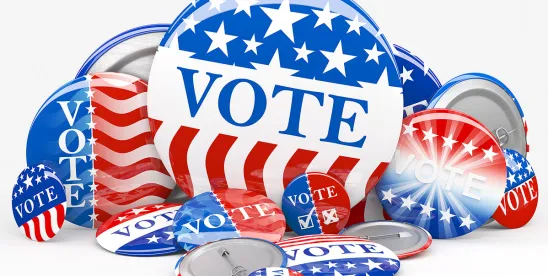Every four years, a U.S. presidential election brings voters to an intersection where they decide whether to turn right or left. Halting at these intersections often brings heightened tension and polarizing discourse within our workplaces and society. Taking proactive measures to ensure the safety and well-being of employees and providing an environment conducive to effective collaboration among employees can help prevent fraught work environments from forming. Here are some practical procedures that employers may want to consider implementing throughout standard day-to-day operations, before and after an election, to efficiently navigate establishing ground rules and policies, fostering environments of open dialogue, and providing support.
Quick Hits
- Before an election, employers may want to take several measures to navigate potential workplace tensions, such as establishing clear guidelines that outline when and where political paraphernalia can be worn, the ground rules for appropriate workplace political discussions, the limitations on political speech in the workplace including bumper stickers, and political postings that help to foster a culture of respect. In addition, employers may want to consider conducting refresher trainings on discrimination, harassment, and workplace conduct policies.
- After an election, employers may want to monitor the workplace for tensions, provide support resources, address incidents promptly, and promote unity and inclusion.
Pre-Election Measures
Communicating Ground Rules
In addition to reviewing and refreshing existing written policies on workplace behavior, employers may want to establish written guidelines that set parameters for all forms of political behavior in the workplace, including political discussions, paraphernalia, bumper stickers, and political postings. Establishing guidelines or ground rules is less stringent than establishing policies—it allows for flexibility and helps to regulate exchanges that may benefit from welcome, healthy, respectful political dialogue. Encouraging civil discourse and respect for differing viewpoints is essential. Employers may want to emphasize maintaining a respectful and inclusive environment, and warn against engaging in heated, divisive discussions. Clear communication of these practical expectations helps prevent misunderstandings and conflicts.
Fostering a Culture of Respect
Leadership plays a vital role in creating and sustaining a culture that produces respect and civility in the workplace. Leading by example, encouraging open dialogue, active listening, and empathy are invaluable ingredients when fostering a culture of respect. Promptly rectifying all occurrences of disrespectful behavior may ensure that employees understand the importance of maintaining a positive workplace culture.
Establishing Clear Policies
Employers may want to review and update their policies related to discrimination, harassment, and workplace conduct before elections. Policies that clearly state the parameters of appropriate and inappropriate conduct, and the consequences for violations, compose a foundation for sustaining a respectful workplace while providing a reference point for addressing potential issues.
Conducting Training Sessions
Conducting training sessions on professionalism, diversity, inclusion, and respectful communication can help employees navigate sensitive conversations, raise awareness of potential issues, and develop an understanding of their coworkers’ perspectives. These training sessions promote a culture of respect and understanding and can provide employees and managers with effective tools necessary to handle conflicts. Consistent training instills the company’s commitment to a positive and inclusive work environment into the morale of employees.
Post-Election Measures
Monitoring for Tensions
After the election cycle has concluded, employers may want to look for signs of heightened tensions or conflicts, keep lines of communication open with employees, and encourage them to report any concerns or incidents of harassment or discrimination. Proactive monitoring helps address issues before they escalate.
Providing Support Resources
Employers may want to offer support resources such as counseling services or employee assistance programs to employees who experience stress or anxiety related to the election outcome—and provide information on how to access these resources confidentially—to help employees lower their stress and anxiety. Providing support helps employees cope with stress and maintain their well-being.
Addressing Incidents Promptly
Swift and resolute action is essential when addressing hostile behavior in the workplace, and incidents of harassment or discrimination. Taking appropriate disciplinary action, thoroughly investigating complaints, and documenting findings are important steps when addressing incidents of hostile behavior. Promptness in rectifying these issues demonstrates the company’s commitment to a safe and respectful work environment.
Promoting Unity and Inclusion
Employers may want to emphasize the importance of unity and inclusion in the workplace, especially after a divisive election. Encouraging employees to come together, find common ground, and work toward shared goals, regardless of political differences, may help foster a positive workplace. Promoting unity helps rebuild a sense of community and collaboration among employees.
Key Takeaways
Employers have a crucial role in ensuring workplace safety and preventing hostile environments in the aftermath of a presidential election. By implementing proactive measures before the election, such as establishing guidelines for political behavior, reviewing and updating relevant company policies, conducting refresher training sessions, and fostering cultures of respect, employers can help mitigate potential conflicts and tensions. Additionally, in the post-election period, employers may want to provide support resources, address incidents promptly, and promote unity and inclusion. By taking these steps, employers can create safe and inclusive work environments where all employees feel valued, respected, and supported, regardless of political beliefs.
Christopher Holloway contributed to this article




 />i
/>i

